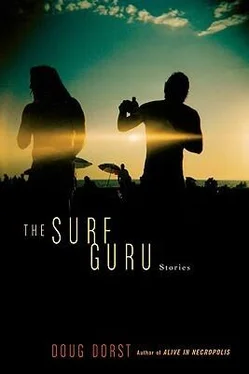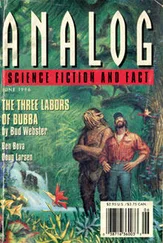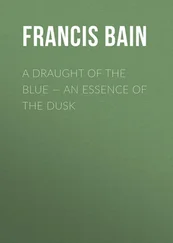With the candidate safely in bed, Renata reads his draft of the speech he will give at tomorrow’s fund-raiser with the riverboat-casino kingpins. She is shocked; his mind has slipped even further than she thought. In strong black ink he has written at the top of the first page: America. It is indescribable. It is so vast that even if we could grasp It by the lower jaw and wrench Its head free, we still could not fathom It. Then thirty minutes’ worth of delusions and outrage and paranoia. The conclusion, double underlined: America is in trouble today not because Her people have failed, but because She is a voluptuary, screwing everything in sight. Because Her shot of nostalgia was administered with a tainted needle. Because tomorrow it will rain and We will die. She sighs and opens a fresh notebook. Words spill from her as soon as pen touches paper. It is effortless; she is just the medium, the translator, the messenger to the Messenger.
Seventeen cigarettes, six cups of coffee, and two bowls of frosted cereal later, she is finished. She reads over her work with pride. She has assembled all the right words in their ordained ritual fashion: compressed nuggets of ideas and opinions and stances, crunchy and wholesome, glazed with a honey-sweet slurry of metaphor suited to the crowd: “chance” and “fate” and “the inside straight,” “split the aces” and “double down,” “loosest slots” and “five-percent vig,” “boxcars” and “baccarat” and “a hard ten on the hop.” It’s a winner. She’d bet her life on it.
The next day, it rains.
A red tarp has been stretched over the deck of the riverboat. Hundreds of chairs are filled with the polyestered bottoms of men and women who fix the odds on slot machines and break the thumbs of card counters. A brass band plays a Sousa march. The tarp billows in the breeze.
Renata takes her place in a chair beside the dais. She is sleep-deprived and feels cotton-headed from seasick pills — she is not one for the water. She watches the small group of supporters gathered on the pier behind crowd-control barricades. Some hold umbrellas and/or children. Some hold home-painted signs, most of which — though her tired eyes can’t read clearly at this distance — appear to lack both verbs and sense. GOD COUNTRY PIE, one seems to say. Others: WE PEOPLE ORDER FORM; LEADSHIP TOMORROW; VALLEY SHADOW OIL ROD; and, curiously, CANIDATE. She listens as raindrops paradiddle on the red plastic above her head, barely notices as the candidate crutches past her and takes his place at the lectern. The band stops, but the tuba player misses the cue and blats out an unaccompanied B-flat.
The candidate comes across as a new man. Invigorated by the words she has fed him, he delivers the lines impeccably— some incantatory, some gruffly barked, some lilting along with the bob of the riverboat itself. Renata, seduced by her own words, has to stop herself from mouthing along. His skin shines with the fervent sweat of a revivalist. Someone says hallelujah; someone answers with amen.
After a final fist in the air, he casts away his crutches and hops down from the dais to the deck, as if he has been healed by his own spirit. There are handshakes and thumbs-ups, ties beating frantic semaphores in the wind, applause like cannon fire. The sun comes out, as if on cue, and casts a blush of red light over everyone.
Renata checks her watch. Five minutes to absorb the glow, then the moorings will be untied and the paddle wheel will turn and they will power down the river while lunching belowdecks. She hopes he does not overeat; at three-thirty he must Charleston at the senior center. She relaxes, lets her head swim freely.
She does not notice the youth lurking in the gangway. He jumps into the candidate’s path, brandishing a sword as rusty as the ideology he will later profess to the TV cameras. As the sword cuts its arc through the air, the candidate’s legs freeze; he swivels his head, looking for Renata, seeking direction. But what can she say? Run? Get away?
The hack is a savage one. The candidate slumps to the whitewashed deck. His mouth opens and closes without a sound. The horror — or the revelation, she can’t tell which — in what she is witnessing is this: the motion looks purely mechanical, a clockwork of mandible and maxilla winding down, coming to rest at half-past-gape.
Renata weaves past the writhing pile of men that pins the assassin to the deck. She pushes numbly through the people who, crying and shouting, surround the candidate. As she kneels in the pooling blood, she sees something rise from the corpse, something curling like smoke in the red light. It plumes straight up to the tarp, then winds outward and escapes into sky, tracing a shape that reminds her of a calla lily blossom. She tilts her head and watches, a strange calm warming her like bathwater. She does not feel herself being jostled, does not hear the keening of grief and the roar of panic; still kneeling, she watches as the candidate blooms into mystery, into romance and tragedy, into something she can make holy.
What Is Mine Will Know My Face
Idrove Trace to the hospital the day they tried to fix his eye. At the time, I was driving a delivery van for a man called Smiley. It was glossy white and cursed on both sides with a caricature of Smiley’s face, in profile, with a gaping comic-book grin — strangely toothless, and scooped out so deep that his ear looked like a hinge on which his whole head depended. sMILEY FLORISTS, it said, and underneath that, Send a Smile to someone you love!
Trace was waiting for me in his uncle’s garage, which was his home on the nights he didn’t stay with his girlfriend, Mo. The garage door was open and Trace was sitting at the foot of his bed, lit by the morning sun. Blue smoke curled up from his cigarette. Around the bed were rakes and bags of potting soil and a rusty seed spreader. Clothing hung on a Peg-Board alongside trowels and shears. He got up and slung the garage door shut behind him. He shook his head at the van. “I can’t believe you drive this, Phil,” he said, getting in. “I can’t believe I’m riding in it.”
His bad eye was barely open. It’d been a few weeks since he got kicked, and the swelling was gone, but the skin around the eye hung slack and was smudged with yellowing bruise. The surgeons were going to replace cracked bone with smooth plastic. They’d told him he might lose sight in the eye. There was always risk, they said. I was the one driving him to the hospital because Mo had gotten stuck at the rehab center where she worked nights. One of the anorexics had opened up her own wrists with something sharp, and Mo had to pull an extra shift to do grief counseling.
“How’s Mo?” I asked. “Did she sound all right?”
“Don’t worry about Mo,” he said.
“A girl died,” I said.
“Mo will be fine. She’s trained for things like that. Whereas I could go blind today, and I’m not trained for that at all.”
“Half-blind,” I reminded him.
“That’s not the point,” he said. “The point is, Mo should be here. I got kicked in the face for her. You’d think there’d be some gratitude.”
“Think of it this way,” I said. “Those girls need her more than you do. They don’t even know to eat.”
He nodded, then flicked the butt out the window. He leaned forward and examined his eye in the visor mirror, ran a finger along the bone below his eyebrow. “I’m just nervous,” he said. “Thanks for the ride.”
“I have to go there anyway,” I said. “I’ve got deliveries.”
He turned in his seat to check out all the flowers in back. “None of those are for me, are they?”
“Of course not. You’re an outpatient.”
Читать дальше












